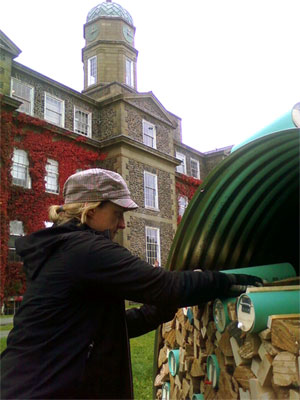 |
| Installation artist Adriana Kuiper assembles the piece, Capsule, behind the Henry Hicks Building. (Ryan McNutt Photo) |
If you have walked between the Henry Hicks Administrative and LSC in the last few days you may have asked yourself, what is that large corrugated steel object sitting in the grass? Did property maintenance misplace its building supplies? Are science students collecting data for an experiment? Has the university begun to make us fallout shelters for protection from the global financial crisis?
Actually, what you have witnessed is a community outreach project by Dalhousie Art Gallery. This structure and several satellite free standing mailboxes represent an attempt for the art gallery to ācatapult its visibilityā on the Dalhousie campus. While it is the oldest gallery in all of Halifax, and prominent in the cityās art community, Dalhousie Art Gallery sits hidden in the basement of the Dal Arts Centre and many students aren't even aware it exists.
The installation, Capsule, was contracted to a young artist formerly based out of Halifax, Adriana Kuiper. She currently teaches sculpture and drawing at Mount Allison University and has shown her work nationally and internationally
Inspired by designs for bomb and fallout shelters, she created this piece with the hope of sparking the same curiosity and emotion that surround such shelters.
Besides adding intrigue to our campus, the work has interactive potential. Students, staff and faculty can use the satellite mailboxes to exchange notes. The gallery has created a signature postcard which has been distributed to all the mailboxes and can be used to write friends or colleagues.
Prof. Kuiper maintains her piece is timely in the present culture of fear that has been created by politicians and the mass media in the wake of 9-11 and other global catastrophes. People are looking more and more towards different forms of protection from the unknown, she says, and this installation represents shelter and protection. The artist has plans to return to Dal campus to talk about the work and answer questions.
Art is important for students to consider, says Sym Corrigan, administrative assistant with Dal Art Gallery. Like many of our academic courses, art enhances critical thinking and is a part of a well-rounded education.
The art gallery would like to thank The Nova Scotia Department of Tourism, Culture and Heritage, pilipiliĀž» and in particular, Facilities Management and Mary Jane Adams, the director of planning, for helping make this project possible.
